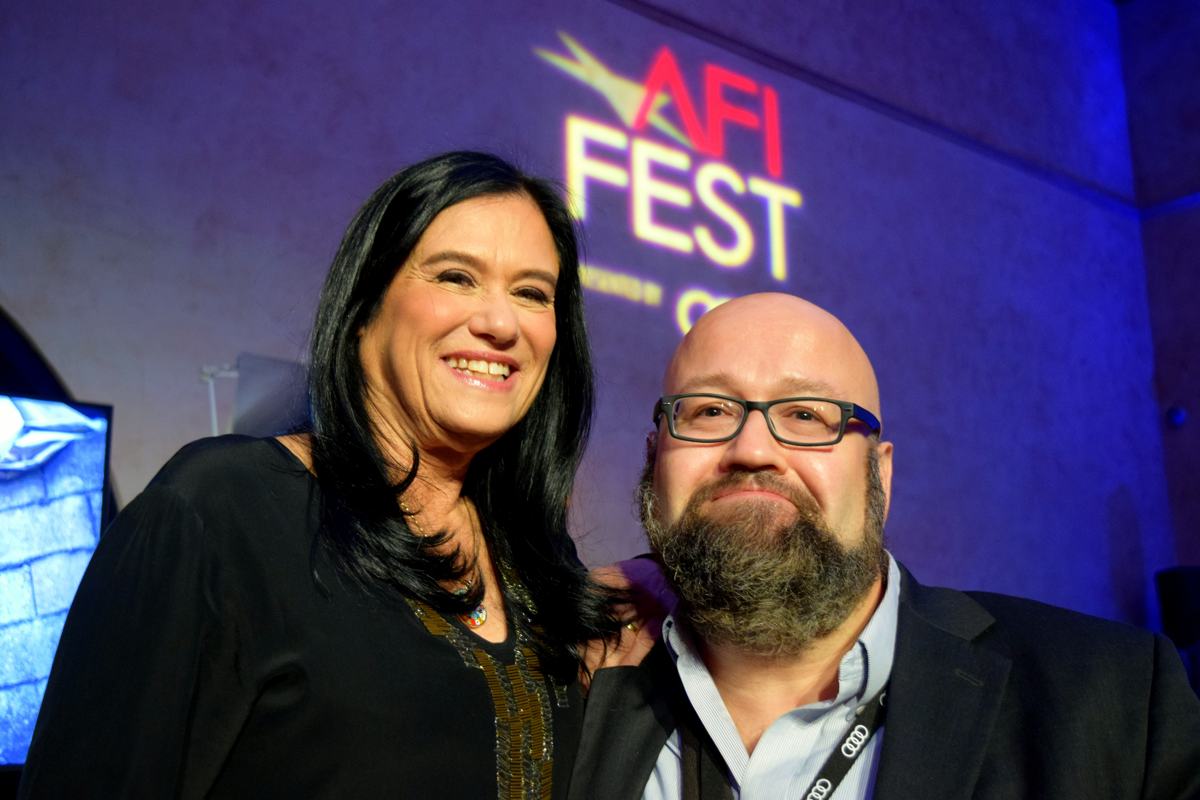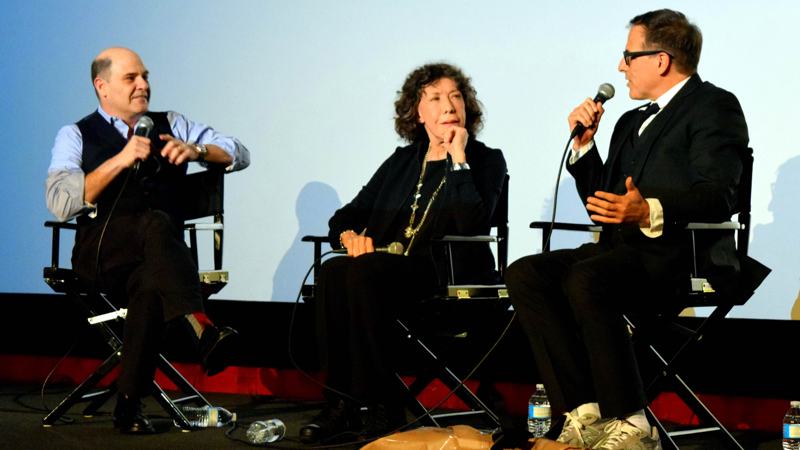
AFI Fest 2016
Hollywood, CA • Nov. 10-17, 2016
by Generoso and Lily Fierro
Even though this was our second year attending, it is still sometimes difficult to believe that the American Film Institute Festival transpires in the seamless way that it does each year. An event that is entirely free for all who wish to attend, AFI Fest features films from around the world, which are usually accompanied by stars and directors galore who stay after screenings to discuss their work and to answer audience questions. The event is administered by an endless team of happy volunteers and staff who even make the process of waiting in line an efficient one by handing out numeric placeholder tickets so that you can exit the line to eat for thirty minutes or so; and, those numbered tickets also work well in quelling the social dilemma of endless morons in line in front of you who decide to let in twenty or so of their friends who show up a few minutes before doors open. This version of line organization is no small feat of administration, we’ll have you know, as we have seen such line-cutting indiscretions in the Northeast lead to countless screaming matches and even odd public displays of the pugilistic arts. Not sure if folks in Los Angeles would go toe to toe over a spot in line, but we find that these things are best left as a mystery.
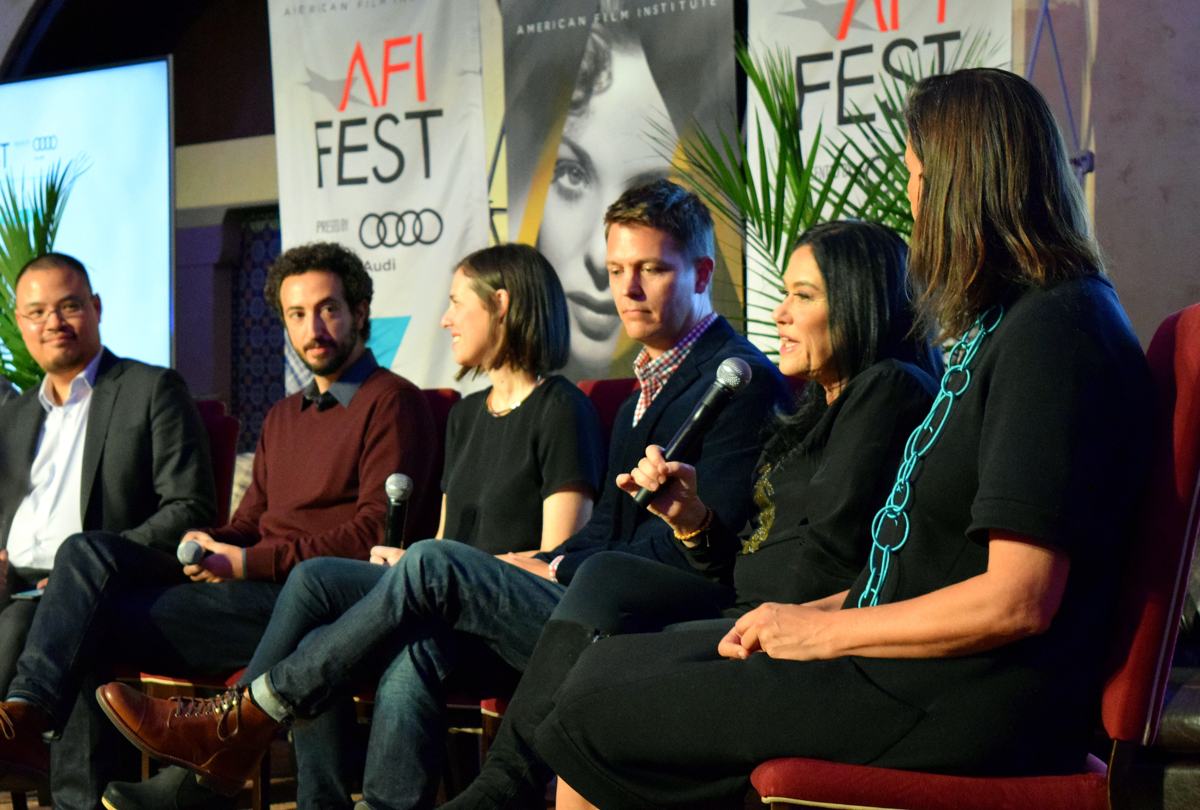
We had a wonderful time during the 2015 festival because, even though we ended up reviewing the event, we mostly spent our time running from screenings into more screenings armed with a bag of free tickets for U.S. premieres of films from directors we greatly admire, such as Jacques Audiard, Arnaud Desplechin, Hong Sang-soo, and Hirokazu Koreeda, and in terms of directing talent, AFI Fest 2016 was shaping up to be another fine year, especially considering that they were able to screen this year’s Palme d’Or winning film at Cannes, Ken Loach’s I, Daniel Blake, the Venice Film Festival’s Golden Lion winner, The Woman Who Left, from Filipino auteur Lav Diaz, and Gianfranco Rosi’s Fire at Sea, the winner of the Golden Bear at the Berlinale. This year’s AFI Fest was also able to acquire the most recent effort from the always entertainingly self-destructive talents of Hong Sang-soo, whose film Yourself and Yours had the love and frenzy you expect from him, and Paul Verhoeven, who presented his much heralded and controversial new film, Elle.
In total, we saw twenty new features (and one amazing retro screening of David O. Russell’s Flirting With Disaster with the director himself and star Lily Tomlin in attendance) at this year’s AFI Fest, which surpassed last year’s total watching by seven films. This ability to see such a staggering amount of films was partially made possible by the wonderful pre-festival press screenings at the AFI main campus, which allowed us to preview many of the films participating in the “New Auteurs” section this time around. These New Auteur screenings outside of the festival allowed us extra time in our festival schedule, which we filled up by conducting interviews with the directors of a few of the films that we enjoyed (links to the interviews are contained in the short reviews below) and attending the documentary panel and even the gala screening and after party for Elle, where we chatted with Paul Verhoeven and his wife, Martine, and where Generoso blew his one and only chance to speak with one of his all time favorite actresses, Isabelle Huppert. Believe us, he has regretted this every day since.
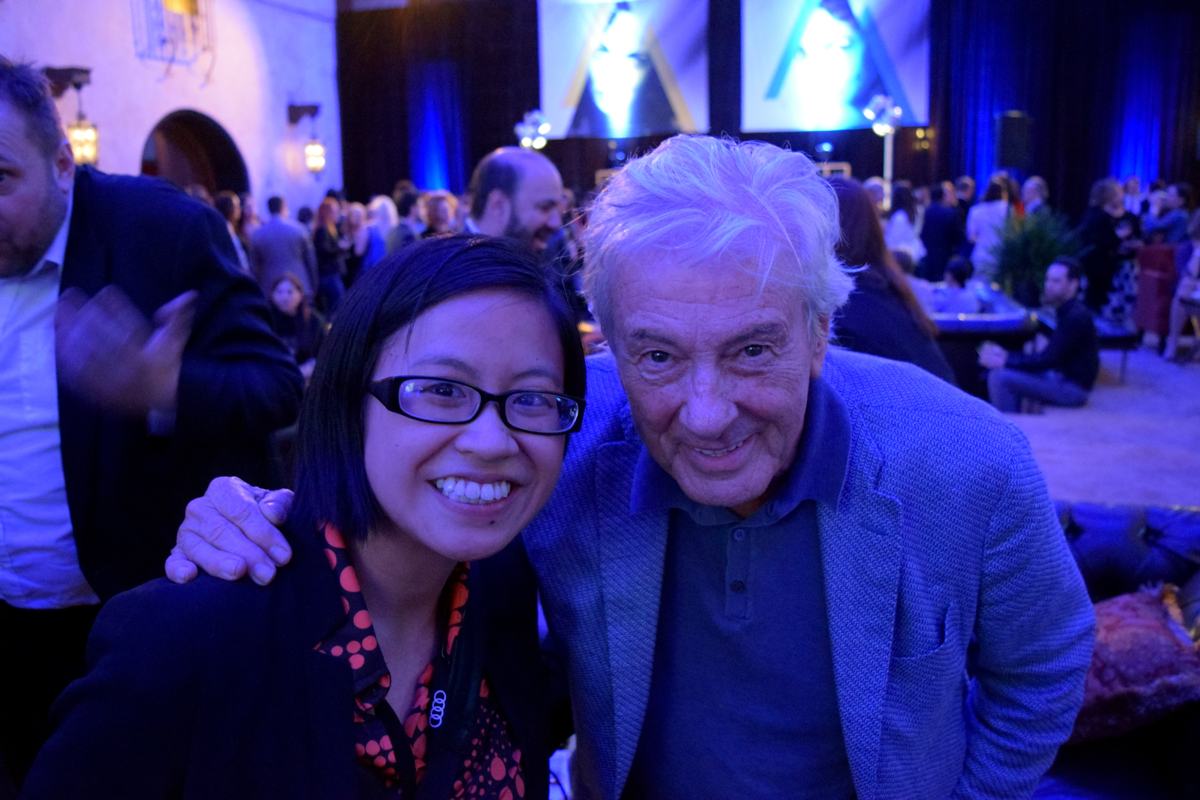
We’ll get deeper into other extracurricular activities such as the award ceremony later in this article, but let’s get to the films that we were lucky enough to have seen this year.
The film reviews below are presented in order based on their rating score (that we define on a scale of one to ten stars). The highest rated films stand at the top of the list, and the lowest rated films sit at the bottom.
• •
In first place for our AFI Fest 2016 film list, and high on our Best Of list for the year, is the aforementioned Golden Lion winning film from Lav Diaz, The Woman Who Left (Ang Babaeng Humayo). Inspired by Leo Tolstoy’s short story, God Sees the Truth, But Waits, this exceptionally realized, nearly four-hour long drama (a short one for Lav Diaz, actually) is set in the director’s native Philippines during a kidnapping epidemic that took place in the year of 1997, the year of Hong Kong’s transfer of sovereignty from Great Britain to China. The Woman Who Left follows the story of Horacia Somorostro (Charo Santos-Concio), a self-educated, forceful, and righteous woman who is released from prison after serving thirty years for a crime that she did not commit. Upon leaving prison, she seeks revenge on the man who framed her, an ex-lover and a wealthy crime kingpin who hides in his home in fear of being kidnapped himself. Diaz’s film slowly and meaningfully unfolds into a complex final statement on fate and forgiveness in the face of corruption that is led by the government and the Catholic Church, who together appear in league against the basic needs of the common people.
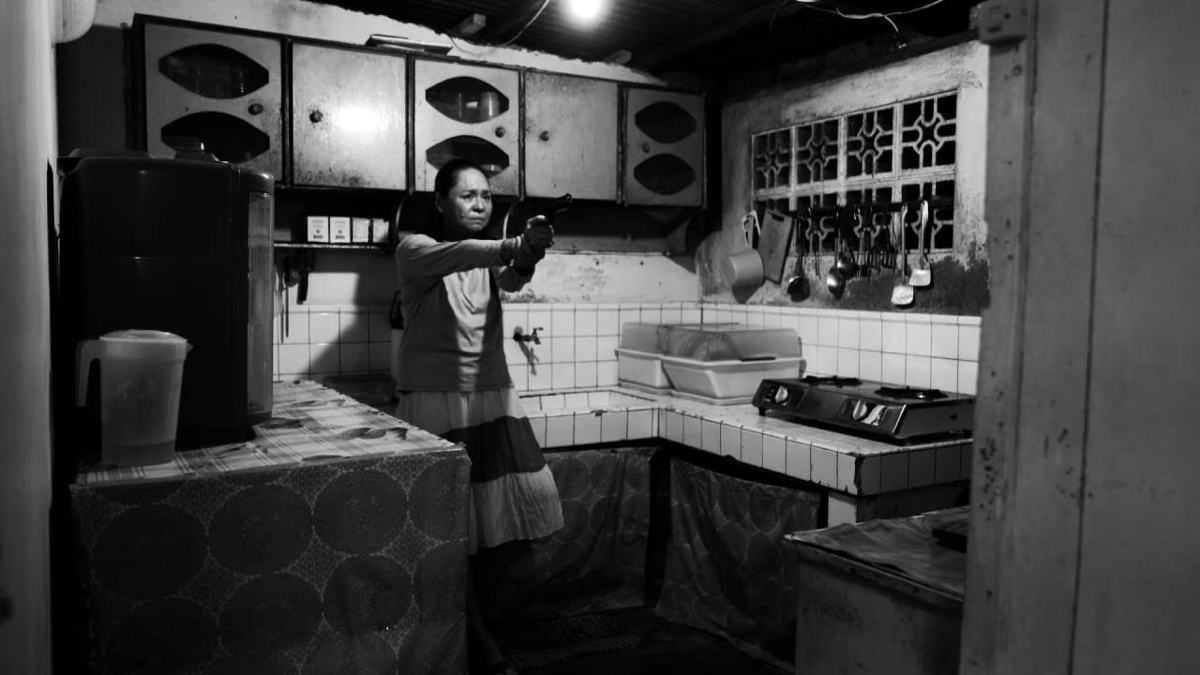
Issues of hypocrisy within the Catholic Church and the devastation that it causes are also the subject of another one of our favorites from AFI Fest 2016, Elle, Paul Verhoeven’s film adaptation of Philippe Djian’s controversial 2012 novel, Oh.. Isabelle Huppert delivers her usually brilliant performance as Michèle LeBlanc, the CEO of a videogame company who bears the shame of being the daughter of one of France’s most infamous mass murderers, a Catholic zealot who, during a crisis of faith, decides to brutally slaughter a neighborhood of parents and children. Early in Elle, Michèle is brutally raped but refuses to report the crime and allows for further transgressions against her as part of a self-imposed penance brought on by Catholic guilt. As the violent atonement proceeds, the identity of the rapist and his relationship with Michèle emerge as an allegory for the unholy alliance between the traditionally vilified Semitic participation in banking and the pious and benevolent public appearance of the Roman Catholic Church. More volatile than anything released in this decade so far, Elle, has been selected as France’s entry into the 2017 Academy Awards and rises as one of the finest films of Paul Verhoeven’s long, turbulent career.
One of the biggest surprises of this year’s AFI Fest came via the New Auteurs programming section with Buster’s Mal Heart, the second feature by Sarah Adina Smith, who directed the unique and regrettably overlooked 2014 film The Midnight Swim. Much will be made of the layered performance of Rami Malek (Mr. Robot) as Jonah in Buster’s Mal Heart, and this praise is indeed deserved, but much credit has to be given to Smith for making an exceptional drama that, although set in and around the Y2K panic of 1999, presents an excellent allegory for disenfranchised people today who find themselves economically and racially out of sync with the current version of a successful society. Smith deftly balances the present and past through memories and dream logic to create an antihero who in appearance seems insane but in reality may have the key to survival.
Cristian Mungiu, who along with Cristi Puiu and Corneliu Porumboiu, represents the leading force behind the Romanian New Wave of the last decade. Both Puiu and Porumboiu have released features over the last few years to varying levels of acclaim, but Mungiu has been oddly silent since his 2012 film, Beyond The Hills, which earned the Best Screenplay prize that year at Cannes. Arguably the most revered of his Romanian peers, Mungiu returned to AFI this year with his Palme d’Or nominated and Best Director at Cannes winning family drama, Graduation (Bacalaureat). Adrian Titieni portrays philandering surgeon, Romeo Aldea, who is trying to balance relations between his wife, his mistress, and the one person he truly loves, his college-aged daughter Eliza (Maria-Victoria Dragus). Even though Romeo is a ranking surgeon at the local hospital, his distinguished career doesn’t pay him enough to afford to send Eliza abroad to Cambridge University, a dream that he desires for her seemingly more than she does for herself. When Eliza is violently attacked on the street the day before her state exams, she performs poorly on the first of the exam series, which puts her scholarship in jeopardy. Left with few options, Romeo must engage in unethical favor peddling in order to secure his daughter a high grade on the second and final exam. Cristian Mungiu’s talents in encapsulating larger issues within his country into a small personal drama are in full display in Graduation, a film that does not strive for the sense of frenetic tragedy of his previous film, Beyond The Hills, yet it is no less gripping due to the moral struggles behind the decisions that his characters need to make.
The fractured state of society was a consistent theme throughout many of the strongest films in this year’s festival, and one of the finest examples came from the brutally honest storytelling of veteran director Ken Loach in his Palme d’Or winning tale, I, Daniel Blake. For the entirety of his fifty-plus year career, Ken Loach has called out the woes of society, whether it is the racism that falls upon the schoolteacher in 2004’s Ae Fond Kiss…, the dangers of privatizing British Rail in his 2001 film The Navigators, and everything in between that befalls the working-class protagonists in the episodes of his own BBC series that aired back in the 1960s, The Wednesday Play. In I, Daniel Blake, veteran BBC actor Dave Johns plays the titular character, Daniel, a middle-aged carpenter who has suffered a heart attack and has been ordered by his doctor to remain unemployed to heal. After a poorly performed physical incorrectly classifies him as being fit for work, Daniel is forced to systematically hunt for a job so that he can be become eligible for unemployment insurance. One day while asking for assistance at the unemployment office, Daniel meets Katie (Hayley Squires), a single mother of two children who is also getting the bureaucratic runaround. These two marginalized people soon become platonic friends who try and help each other survive while the broken system that is supposed to assist them begins to miserably fail.
There is no silver lining here, as Loach clearly lays on all of the tragedy stemming from globalization combined with a government that is woefully inadequate in compensating for the failing economy. Our packed screening of I, Daniel Blake was eerily silent with the only exception being the sound of crying from the audience, which was most likely composed of many people who, given the Monday early afternoon time slot, had a lot in common with our film’s heroes.
On a lighter but no less contemporarily-relevant front is the Finnish film based on a real-life event, The Happiest Day in the Life of Olli Mäki (Hymyilevä mies), the second feature from director Juho Kuosmanen. Olli Mäki (Jarkko Lahti) is about to become the 1962 World Featherweight Boxing Champion, a title predicted and desired by everyone in Finland except for Olli Mäki himself. Olli has just met Raija (Oona Airola), the love of his life, so the fact that the current champion from the United States, Davey Moore, is flying in for a title fight, which will be seen by thousands of his countrymen at the stadium in Helsinki, now seems of lesser importance. Are his love for Raija and the manager-mandated absence of her causing this doubt in Olli? Is his doubt about fighting against a proven champion or the non-stop commercial hype machine around him that makes the whole event seem like a long con making him nihilistic about winning? Expertly shot in glorious black and white by cinematographer J.P. Passi, The Happiest Day in the Life of Olli Mäki is a cynical, albeit sweet retelling of this small moment in Finnish sports history that meant more to people away from the ring than those inside of it.
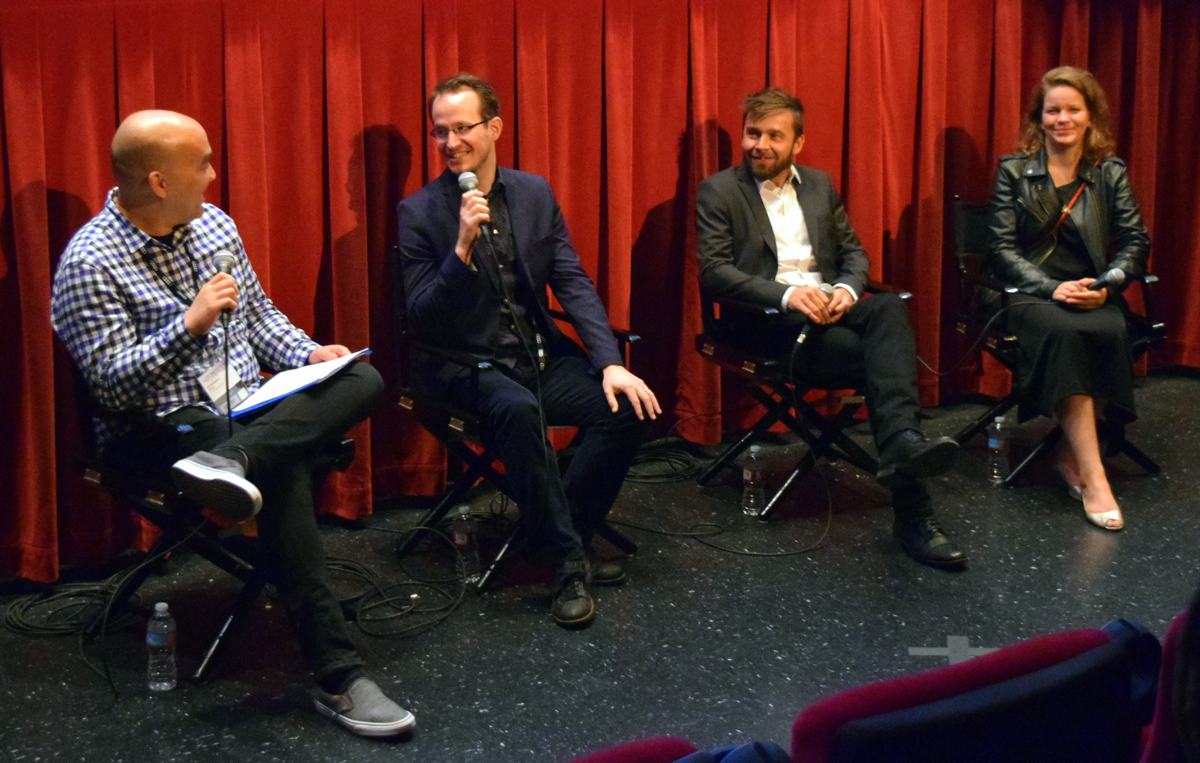
Hong Sang-soo has built a body of work based on a formula that relies on his main character’s self-destruction. In most of Hong’s films, we see a relationship fall apart; sometimes we see it begin; sometimes we see it repair, and all of these activities occur in a warped sense of time where the present is never the present, and the past is not the only past. Yourself and Yours is true to the purest of this signature Hong form. In this most recent film, Youngsoo (Kim Joohyuck) struggles to trust his beautiful girlfriend Minjung (Lee Youyoung), and as a result, the two part ways. As he attempts to recover from the breakup, we, as the audience, see Minjung take on multiple personas as she spends time with various men. We gradually get a sense that these personas represent all of the ways that Youngsoo and his meddling friends look at her, and quickly, we realize that in all of these different versions of Minjung, we have lost the true Minjung, or we may have never known her at all because she might have never existed.
This confusion surrounding the truest form of Minjung amplifies because all of the men who show affection for Minjung in her different states are creators who may also look at her in some idealized form. Youngsoo himself is an artist. One man (Hong favorite Kwon Haehyo) is a writer. Another (Yu Junsang) is a director. So, we must ask: is Minjung just a muse that cannot be reached for all of these men? Is the real Minjung not Minjung at all because “Minjung” is just the name of a heightened representation of a woman of another name who exists in reality? Hong does not provide a direct answer to the identity of Minjung, for what is most important in the film is the shedding of all of the perceptions of Minjung (or not Minjung) in order to allow Youngsoo to love unconditionally. Yourself and Yours could have benefitted from a more cinematically expansive visual style (it looks more like 2010’s Oki’s Movie than 2015’s Right Now, Wrong Then or 2011’s The Day He Arrives), but its small screen look does help the film feel like a derailed soap opera romance that is steering wildly through no clear path into a place where no soap opera has gone before.
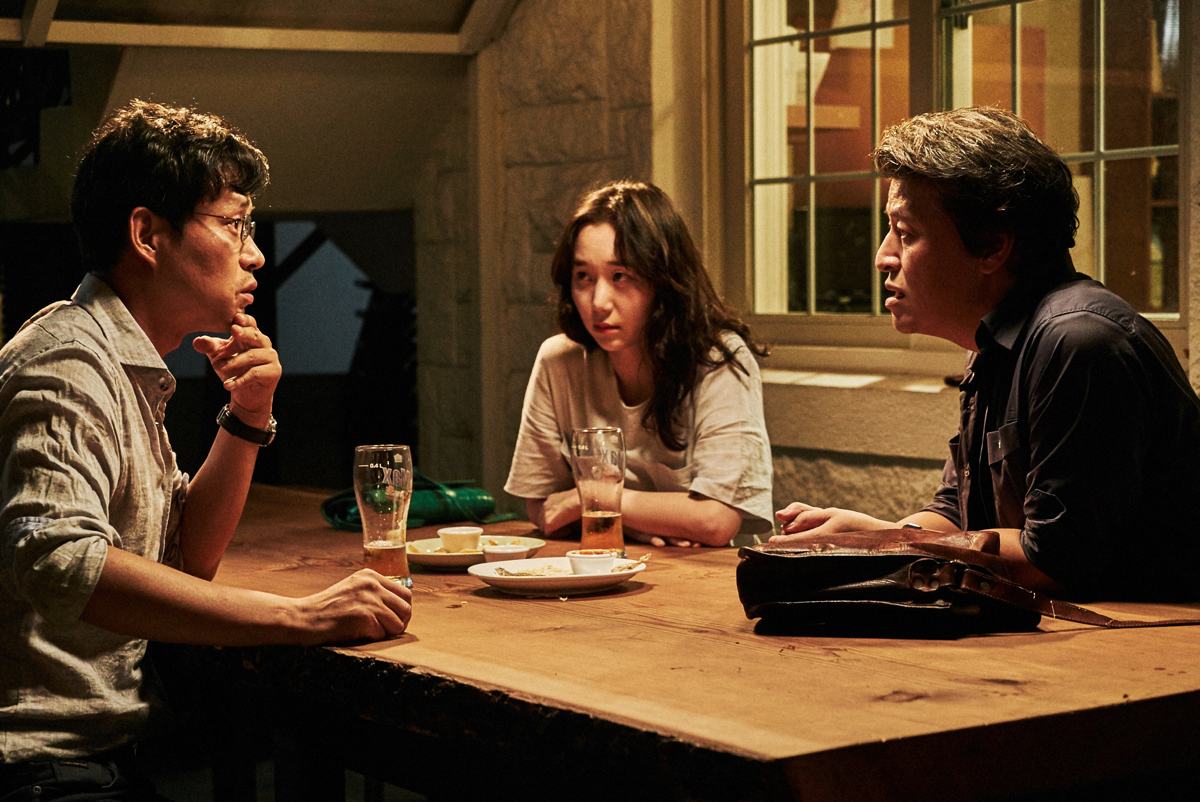
Winner of the American Independents Audience Award at AFI Fest 2016, Donald Cried exemplifies the strengths of American Independent cinema: simple premises with sharp execution, solid dialog, impeccable acting, and characters and energy that remind you, sometimes too much, of moments in real life. Director Kris Avedisian stars as the title character, Donald, the metalhead who never quite grew up but has a humble sweetness to him that always reminds you of being a teenager, and in contrast to Avedisian, Jesse Wakeman portrays Pete Latang, an uptight stockbroker who left his life in Warwick, Rhode Island for a more serious Manhattan city life. Set in the dreadful, gray, slushy New England winter, Donald Cried focuses entirely on Pete’s return home to tie up various affairs in the wake of his grandmother’s death. When Pete arrives back to Warwick, he hopes to quietly return and leave without notice; however, fate wants something else, and Pete loses his wallet in transit, and his only transportation, a car frozen in the driveway of his grandmother’s house, fails, so he must cross the street and ask for the help of his neighbor and childhood friend, Donald.
As Pete and Donald spend time together, we constantly feel uncomfortable about how little Pete wants the reunion and how much Donald does, and, sometimes, we do not know what to do but laugh to try to release the discomfort. Donald Cried plays with Pete’s guilt and how it manifests in his own demeanor and Donald’s actions, and by the end, regardless of who you identify more with, you empathize with both, even if you are neither a cold stockbroker nor a loveable metalhead, because both men are acutely aware of their past and current worlds, which simultaneously unite them while guaranteeing that their futures will be apart from each other. Avedisian overwhelmingly succeeds with his debut feature; his scope, humor, pacing, and setting for Donald Cried are all just right, and together they create a film that reminds us of why we really cannot go home again—especially if we try to do so on purpose or by accident.
One of the finest debut feature films from this year’s AFI Fest is the highly stylized satire on upper middle class apathetic Brazilian youth from director Anita Rocha da Silveira, Kill Me Please (Mate-me por favor). Our often grotesque social commentary film begins with the murder of a call girl that leads to more and more bodies turning up in the fields of the West Side Zone neighborhood in Rio de Janeiro, where a group of teenaged girls led by Bia (Valentina Herszage), Michele (Julia Roliz), Mariana (Mariana Oliveira) and Renata (Dora Freind) sort of go to high school, text constantly, perform dance routines for imaginary cameras, and gossip their way through the bloodbath, with the growing carnage providing our pack of teens the necessary faux concern needed to balance their lives against unlimited opportunities of banal, ill-advised sexual adventures. Kill Me Please is a riveting and fast-paced critique of apathetic youth that goes out of its way to avoid exploitation while consistently playing with you in a visually inventive way, compelling you to watch it all unfold into a kind of sick glee.
In his debut feature film, My Entire High School Sinking Into the Sea, Dash Shaw takes all of his best techniques from his comics and pushes them into the time-based medium of animation to create a visually alluring whir of moving painted backgrounds and shifting colors, patterns, and textures paired with a story about redemption, love, and friendship. Dash (Jason Schwartzman) and Assaf (Reggie Watts) are writing partners. Dash has a flair for the fantastic, and Assaf has a preference for journalistic integrity; and together, they write stories for their DIY paper. When the editor, Verti (Maya Rudolph), convinces Assaf that the pair should write separately, Dash lashes out at them with libel and ends up alone, leading him to the discovery that his high school is not up to building code, so the heralded new rooftop addition will cause the school to plunge into the nearby sea the moment the earth trembles, which it does.
Though My Entire High School Sinking Into the Sea shares its foundation with any classic coming-of-age tale, it has Shaw’s characteristic whimsy, humor, and awkwardness, which makes the film far funnier and more engaging than most John Hughes-esque films about teenage angst and paths to maturity. The film fuels itself on the absurdity of teenagers’ myopic perspectives on their own world, even in times of crisis, and as a result, even though the film does structure itself around Dash and Assaf’s reconciliation, the major hero of the film is the wise Lunch Lady Lorrain (wonderfully voiced by Susan Sarandon), the burly lady who looks at her job as a responsibility to the wellness of the students and who, in turn, saves many in the wreckage by strapping them onto her body and carrying them as she navigates through the disaster. For the animation style, Shaw and lead animator Jane Samborski take visual cues from American Pop, Spider-Man, and Yellow Submarine, so My Entire High School Sinking Into the Sea has wonderfully psychedelic imagery that mesmerizes, which compensates for the moments where some of the voice acting from Schwartzman and Watts fails or the moments where the plot gets a little too clumsy.
Inspired by her own pregnancy, Alice Lowe wrote, directed, and starred in Prevenge. Always enchanting, Lowe has been an actress for Ben Wheatley and Simon Pegg, and if you love Snuff Box as much as we do, you also may remember her excellent take on David Bowie. In Prevenge, Lowe plays Ruth, a pregnant young woman who has recently lost her partner in a climbing accident. Ruth’s baby seems to have more than a touch of evil in her, and she speaks to Ruth and encourages her to murder people. As the bodies pile up, we begin to see that the victims may have played a role in the death of Ruth’s partner, but Ruth’s motivation for vengeance may not actually come from her apparently sinister baby. The first half of Prevenge struggles to find its identity, tripping in between a slapstick comedy and a visceral slasher, so some of the early killings have too much of an awkward campy feel to them, but by the end Lowe focuses the tone into one of direness, and Prevenge becomes a well-crafted, introspective work of psychological horror. Throughout the film, Lowe is excellent, playing Ruth sympathetically while slowly conveying her broken psyche, and as a result Prevenge is a fun little flick that will be perfect for midnight screenings at your favorite arthouse theater.
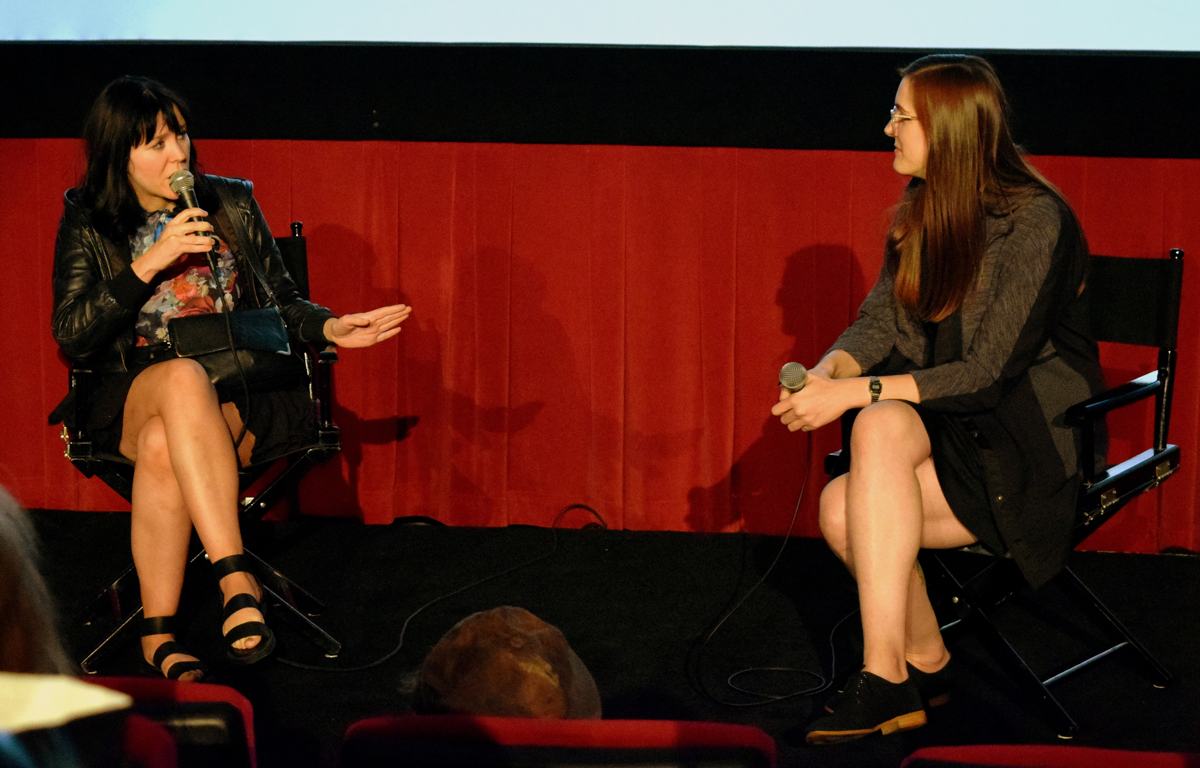
Charlie Lyne’s engrossing second feature, Fear Itself, is a sometimes effective cinematic essay on the artistic method of creating fear within the horror genre. The entirety of Lyne’s film utilizes horror clips from the well-known to the rare, which range in era from classic works like Murnau’s 1922 film, Nosferatu, to David Robert Mitchell’s critically praised 2014 scarefest, It Follows, in order to illustrate how the genre uses the calm, the buildup, and in some cases the actual delivery of terror to draw your fear. Using a similar method to Mark Rappaport’s video experiments, Rock Hudson’s Home Movies and From The Journals of Jean Seberg, Lyne differentiates himself from Rappaport by only using over-narration provided by actress Fairuza Balk, whose unemotional delivery of the film’s core thesis begins to drone on about thirty minutes into the watch, as her voice eventually gets superseded by the thoroughly intense imagery onscreen. The final result of Fear Itself is a piece of cinephiliac porn that is more entertainment than it is essay.
One of the most exciting parts of AFI Fest is the opportunity to see award-winning features from international filmmakers, and we were looking forward to seeing Ralitza Petrova’s Golden Leopard winning, debut feature Godless (Bezbog). The film is already being compared to Barbara Loden’s Wanda, but it lacks something essential to that seminal film that starred the director and writer herself: minimalism that unrelentingly commits to its central character. Though uncompromised in its severe mood and tone, Godless fails to place complete focus on the fascinating protagonist of the film, Gana (Irena Ivanova), a morphine-addicted nurse who sells her elderly patients’ ID cards to people who use them to open up fraudulent credit accounts. Gana is unfazed by most things; the blatant corruption of the police officer and judge that she works for does not bother her. Her complicity in the accidental murder of one of her patients does not shake her. However, Yoan, a former prisoner under Bulgaria’s communist rule, finally begins to change her, but only too late, and Gana will need to find her own way to pay for her sins.
Over the course of Godless, moments with Gana are meditative and intimate, so much so that you never want Irena Ivanova to leave the screen. Consequently, when we see scenes such as the corrupt judge and police chief chatting before entering an orgy or the close up of a funeral wake in an ornate church, they add contextual drama to the film and underscore the direness of the society Gana lives in, but they interrupt our study of Gana and the nuances of her transformation, which are the strength of the film. As a debut feature, Godless has promise in it, although it falls short of any of the careful studies of a person attempting to navigate a crumbling societal structure seen in Cristian Mungiu’s films, including the aforementioned Graduation.
Drawing an editing style from Stan Brakhage, Dean Fleischer-Camp’s 52 minute spastic ode to the evils of consumerism, Fraud, shows us a family in credit freefall. The film begins with our family of four going on a teenaged spending spree at the local mall before coming to the shocking realization that the bills will soon be coming due. As the debt mounts, mom and dad torch the home and take the kids on a trip with their ill-gotten insurance funds. All of this is captured by the dad-child who never lets go of the camera—he even goes so far as to film the arson (yes, I thought that was a bit much as well). Even though they know that the law is in hot pursuit of them, our band of plastic card wielding villains still stop a few times to take in the sights, pick up survivalist-grade firearms, and eventually make it over the Canadian border for some more shopping with the bonus of an even higher sales tax rate. Fraud ends with Fleischer-Camp’s essential cautionary tale about globalization and consumerism, which is delivered loud and clear and at about the right length.
The most disappointing aspect of Joshua Locy’s debut feature, Hunter Gatherer, is the waste of an excellent performance by the film’s star, Andre Royo, who most audiences know from The Wire and more recently Empire. Andre Royo plays Ashley, a neurotic, middle-aged man, recently released from prison, who must live with his mother while figuring out his next move. One day, while trying to sell a ladder, Ashley befriends a simple man named Jeremy (in a fine performance from George Sample III), who Ashley cons into helping him with his refrigerator disposal business. Not satisfied with just having a good friend and business partner, Ashley heartlessly hooks up with Jeremy’s aunt, Nat (Kellee Stewart), while still relentlessly hounding his ex-girlfriend Linda to pick up where they left off. Royo is the shining star of Locy’s debut film, which sadly borrows too much of its style, both visually and in offbeat character construction, from the early films of his colleague, David Gordon Green. Locy, having worked as an art director on previous Green efforts Prince Avalanche and Manglehorn should have infused the film with more of his own style as Hunter Gatherer, despite a few fine performances, comes off as just a pale imitation of Green’s best early work.
It has been a dozen years since Yang Chao won Special Mention at the 2004 Cannes Film Festival for his film Passages, where a young couple go on a planes, trains, and a slow boat escapade through Mainland China in the search for a special wild mushroom that becomes a metaphor for dissatisfied Chinese youth. Yang was immediately lumped into the “Sixth Generation” movement of Chinese cinema, but Passages, though promising, offered a commentary that was nowhere near the level of scathing social critique that Jia Zhangke, a true member of the movement, had displayed with The World, which was released in the same year. After twelve years, Yang has returned with master cinematographer Mark Lee Ping Bin (In the Mood for Love, Café Lumière), to deliver Crosscurrent (Chang jiang tu), a meticulously shot, pretentious bore of a feature that works more like a picturesque National Geographic triptych up the Yangtze River for Western audiences than an acute cultural statement of present day China. A writer travels by boat and makes love Wong Kar-wai style with the same woman at each stop. Literary references abound, and the whole film exists as a metaphor between humanity and art and the eternal with absolutely no desire to establish a link between the characters and the changing landscape in order to draw you into the allegory.
When Polish director Agnieszka Smoczynska took the stage before the screening of her debut feature, the musical mermaid film, The Lure (Córki dancingu), she proudly announced that she comes from the country of Krzysztof KieÅ›lowski, but as he hated musicals, her country never makes them. Well, if Krzysztof were alive, I doubt that he would sway from his position as The Lure does nothing to advance the genre, and it even fails to just simply entertain you. The Lure is the story of a pair of entrancing mermaid sisters who find a home in a tawdry cabaret. One of the sisters enjoys the humans and demands love from them, while the other sister views the humans as a food source. Smoczynska throws “shocking” sexuality and campy tunes your way in the hopes that you will be happy with telling your friends that you have seen a sexy Polish mermaid musical.
Sadly, the film that received more than a few awards at this year’s AFI Fest was one of the most feeble attempts at a crime-drama, coming-of-age film that we have seen in some time. Houda Benyamina’s Divines is a wretched blending of high-gloss Hollywood style (with a bit of cellphone video for that “edgy” touch) and a dizzying collection of cinematic clichés, most of which were borderline infuriating to watch. It is as though Benyamina thought that she was doing something unique in giving a contemporary update to a thirties gangster film, or if she was actually trying to be hard-hitting, you must wonder if she has ever seen a Jacques Audiard film before making Divines, the story of Dounia (Oulaya Amamra), a teenaged girl who grows up in a Roma camp and dreams of becoming a drug dealer to get out of her predicament. As clichés abound, Dounia must have the good hearted friend who goes along for the ride, only to end up caught in the crossfire, and the love interest, a dancer who our budding crime kingpin spends days watching from the rafters of a local theater. I assume that most of the credit goes to Divines for switching the gender of the protagonist, but this is a paltry nuance for a genre that has already been done to exhaustion.
What in the world has happened to Kim Ki-duk? The once promising director of Bad Guy, 3-Iron, and Spring, Summer, Fall, Winter… and Spring has degenerated into a sloppy, melodramatic mess as of late, and no film typifies his recent downfall more than The Net. With his new film, Kim reduces the ideological struggle between North and South Korea into what appears like a Lifetime Channel family drama that uses the ethos of both nations as convenient plot devices to further a thin narrative about a North Korean fisherman whose net gets caught in his motor, which forces him to drift into South Korea where he is arrested and detained as a spy. Kim clumsily presents South Korea as a hypocritical state that boasts of peace while under the rule of rampant, soulless consumerism where decent women are forced into prostitution, and brutal cops offer no semblance of fair treatment. These may very well be true critiques, but the manner by which they are handled here leaves these claims as unfounded as names called across a school yard. The performances are quite poor overall, as is the film’s visual aesthetic that looks more like a student project than the 21st feature film of a veteran director.
We were massively underwhelmed by Maren Ade’s previous directorial effort, 2009’s Everyone Else, a toothless romantic drama that was utterly flat in its concept and execution. Since then, Ade has thankfully stayed away from directing, concentrating her efforts on production, which have resulted in two of our favorite films of this decade, both by Miguel Gomes: 2012’s Tabu, and our favorite film of this year, the three-part masterpiece that is Arabian Nights. Given these production successes with Gomes combined with unparalleled positive reviews, we were indeed excited to see Ade’s nearly three-hour father-daughter comedy, Toni Erdmann, that unfortunately we will now refer to as the biggest disappointment of this year’s AFI Fest. Inspired by Andy Kaufman’s audacious alter-ego Tony Clifton, Toni Erdmann is just a slightly ruder Capra-esque father-daughter story about an uptight, cutthroat businesswoman named Ines (Sandra Hüller), who is brought back to humanity by her wild and crazy dad Toni, who poses as a “consultant and coach” for the chief executive of Ines’s company in an attempt to teach his child a lesson. I suppose that brandishing Austin Powers-styled fake teeth qualifies as great German comedy these days, which in and of itself is quite sad, but Toni Erdmann’s ham-handed attempts at social commentary are even more clichéd and painful to watch than its attempts at humor.
• •
On the last day of AFI we were invited to the Awards Brunch, a lovely event which was held in the same grandiose room that a few nights earlier had housed the Elle gala after party. There were a few surprises in the awards that were announced that morning, and AFI has been kind enough to list those winners here. We must note that we were thrilled that one of the more impressive short films that we saw, The Send Off, a heartfelt look at the prom preparations and festivities of students in a depressed rural American town, was honored. Directed by Ivete Lucas and Patrick Bresnan, the short film was presented with a Live Action Short Special Mention for Documentary. The brunch also gave us the opportunity to talk with other critics about this year’s strong programming at AFI, and to give a special thanks to a few of our favorite volunteers and AFI Staffer, Johanna Calderón-Dakin, whose assistance was invaluable in helping to set up interviews and press screenings. See you all next year! ◼
During AFI Fest 2016, we were able to interview Sarah Adina Smith (Buster’s Mal Heart), Dash Shaw (My Entire High School Sinking Into the Sea), and Juho Kuosmanen and J.P. Passi (The Happiest Day in the Life of Olli Mäki). Those interviews will appear on Ink 19 this week. Look out for them!
